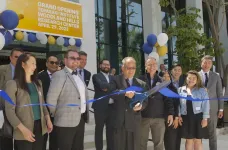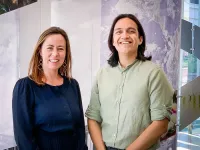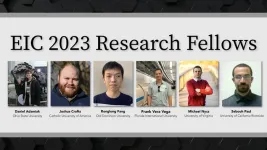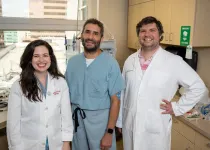(Press-News.org) (WOODLAND HILLS, CA) – The Terasaki Institute for Biomedical Innovation (TIBI), a non-profit research organization devoted to developing bioengineered systems, devices, and technology for biomedical applications, held a Grand Opening celebration at their newest research facility in Woodland Hills. The event drew almost 100 guests, which included local dignitaries, members of the Terasaki family, TIBI faculty and staff, and members of the building’s design and construction teams.
A special Grand Opening program, emceed by KTLA 5 Morning News anchor Frank Buckley, began with certificates of commendation presented by Robert J. Blumenthal, Los Angeles City Councilman, 3rd Council District, and representatives from the offices of Linda Horvath, Los Angeles County Supervisor, 3rd Supervisorial District, and City of Los Angeles Mayor Karen Bass. In addition, a flag that once flew over the United States Capitol in 2018 was presented to the institute from District 32’s Congressman Brad Sherman.
This was followed by addresses given by members of TIBI’s executive team and scientific faculty, who described TIBI’s many realms of ongoing research, innovation, and entrepreneurial endeavors. The program also included recorded congratulatory remarks given by Dave Whelan, CEO of Bioscience LA, a non-profit organization that provides resources, coordination, and support for bioscience organizations in the Los Angeles area.
“It was very gratifying to see the interest and support from the audience and from the community at this event,” said TIBI President, Stewart Han. We were proud to present our brand-new facility and exciting research and we are looking forward to being a major component of Los Angeles’ vibrant bioscientific research hub.”
A ribbon-cutting ceremony was conducted in front of the building, followed by a reception and public tours of the laboratories.
The Woodland Hills laboratory is the third of the Terasaki Institute’s facilities, named after the late Dr. Paul I. Terasaki, a pioneering scientist in the field of organ transplantation, who dedicated his life to impactful medical research.
The new building offers 50,000 square feet of floor space for state-of-the-art equipment and up to 200 employees.It will also be able to accommodate meetings, seminars, and conferences to further the education and exchange of ideas among researchers and collaborators. When combined with TIBI’s administrative and research and development buildings in Westwood and West Los Angeles, the institute grows to almost 100,000 square feet of space.
“I’m very excited about the addition of the new building to the Terasaki Institute. I believe it will give us the research space needed for our scientists to develop the best in biomedical innovations, while allowing for growth and expansion of the institute,” said Terasaki Institute’s Director and CEO, Ali Khademhosseini, PhD. “After seeing all the effort that went into creating this new building, it gives me great joy to see it come to fruition.”
About the Terasaki Institute for Biomedical Innovation
The Terasaki Institute for Biomedical Innovation is accelerating the pace of translational research by supporting the world’s leading scientists with an open, entrepreneurial environment for bioengineering new materials, biological models, and advanced technologies to address critical challenges to the health of the planet and its people. The Institute’s worldwide collaborations with academic, clinical, and entrepreneurial partners provide a rich foundation for translating innovations to the real world.
END
Terasaki Institute holds grand opening celebration at new research center
2023-05-05
ELSE PRESS RELEASES FROM THIS DATE:
Tuning brain cells with light
2023-05-05
An international research team, comprising scientists from DZNE, University Hospital Bonn, the Netherlands, and the US has been awarded a US$ 1.3 million grant by the “Human Frontier Science Program” to investigate brain immune cells and manipulate them via light irradiation. This will involve using gene transcripts (mRNAs) as molecular mediators. From these laboratory studies, the scientists aim to gain new insights into how these cells change their shape in response to hazards and the role they play in neurodegenerative ...
Secret behind Amazonian 'dark earth' could help speed up forest restoration across the globe
2023-05-05
Between approximately 450 BCE and 950 CE, millions of Amerindian people living in today’s Amazonia transformed the originally poor soil through various processes. Over many human generations, soils were enriched with charcoal from their low-intensity fires for cooking and burning refuse, animal bones, broken pottery, compost, and manure. The result is Amazonian dark earth (ADE) or terra preta, exceptionally fertile because rich in nutrients and stable organic matter derived from charcoal, which gives it its black color.
Now, scientists from Brazil show that ADE could be a ‘secret weapon’ to boost reforestation – not only in the Amazon, where 18% or ...
Altruism can make job seekers afraid to negotiate salary
2023-05-05
AUSTIN, Texas — Job seekers looking to land a role with an altruistic organization may feel too guilty to ask for higher pay, according to a new study from the McCombs School of Business at The University of Texas at Austin.
Both for-profit and nonprofit organizations increasingly employ what has been termed “social impact framing” that emphasizes that their work has welfare benefits for society.
Although companies might have entirely noble intentions when using social impact framing, a recent study by Texas McCombs Assistant Professor of Management ...
How diet quality affects the gut microbiota to promote health
2023-05-05
URBANA, Ill. – We know that eating a healthy diet affects body weight, cholesterol levels, and heart health. A new study from the University of Illinois focuses on another component: the role of diet in supporting a healthy gastrointestinal microbiota. The researchers conclude that following the Dietary Guidelines for Americans (DGA) promotes a gut microbiota composition that may support overall health.
“Currently, there is no definition of a ‘healthy’ microbiome. Understanding how diet may influence the structure of the gut microbiota is important so we can make recommendations on dietary approaches,” says ...
EIC Center at Jefferson Lab announces six Research Fellowship Awards
2023-05-05
NEWPORT NEWS, VA – The Electron-Ion Collider Center at the U.S. Department of Energy’s Thomas Jefferson National Accelerator Facility (EIC Center at Jefferson Lab) has announced the winners of six new research fellowships. Over the next year, the fellows will work to advance the science program and further the research of the Electron-Ion Collider (EIC). The EIC is a unique physics research facility dedicated to answering fundamental questions about nature’s building blocks.
The EIC is slated to be built at Brookhaven Lab in partnership with Jefferson Lab and scientists worldwide. The ...
The Texas Heart Institute and The University of Texas at Austin awarded a National Institutes of Health grant to develop injectable hydrogel electrodes to prevent ventricular arrhythmias
2023-05-05
The Texas Heart Institute and The University of Texas at Austin received a four-year, $2.37 million grant from the National Heart, Lung, and Blood Institute to develop a novel method of managing ventricular arrhythmias, which cause sudden cardiac death. The research initiative is the brainchild of Dr. Elizabeth Cosgriff-Hernandez, Professor of the Department of Biomedical Engineering, Cockrell School of Engineering at The University of Texas at Austin, an expert in biomaterial scaffold engineering for tissue repair and regeneration and electrophysiology medical device pioneer and clinician ...
Majority of NHS Trusts do not offer training to prevent sexual harassment, study finds
2023-05-05
Failure to implement active bystander training could thwart NHS attempts to tackle sexual harassment, say researchers at the University of Cambridge.
An analysis of data from Freedom of Information (FOI) requests found that fewer than one in five NHS Trusts in England provided active bystander training to address workplace harassment, sexual harassment and other forms of unacceptable behaviour like bullying and racism.
It found of those that did – the majority of which were in London – most did not deliver content specific to sexual misconduct and ...
Only one NHS Trust offers standalone training on sexual harassment intervention, study shows
2023-05-05
Only one NHS Trust offers its staff training focused on how to intervene when they witness sexual harassment at work, according to new research published in JRSM Open.
Dr Sarah Steele of the University of Cambridge and Jesus College, Cambridge, and Dr Ava Robertson, received responses from 199 NHS Trusts to their Freedom of Information request. Of those, 35 Trusts offer their staff Active Bystander Training (ABT) but only one of these has a specific module on sexual harassment. While welcomed by the researchers, they note that even that one module is optional for staff and outsourced to a private provider. No staff have yet completed the module.
Of the 163 Trusts ...
Mobile phone calls linked with increased risk of high blood pressure
2023-05-05
Sophia Antipolis, 5 May 2023: Talking on a mobile for 30 minutes or more per week is linked with a 12% increased risk of high blood pressure compared with less than 30 minutes, according to research published today in European Heart Journal – Digital Health, a journal of the European Society of Cardiology (ESC).1
“It’s the number of minutes people spend talking on a mobile that matter for heart health, with more minutes meaning greater risk,” said study author Professor Xianhui Qin of Southern Medical University, Guangzhou, China. “Years of use or employing a hands-free set-up had ...
AI training: A backward cat pic is still a cat pic
2023-05-05
Genes make up only a small fraction of the human genome. Between them are wide sequences of DNA that direct cells when, where, and how much each gene should be used. These biological instruction manuals are known as regulatory motifs. If that sounds complex, well, it is.
The instructions for gene regulation are written in a complicated code, and scientists have turned to artificial intelligence to crack it. To learn the rules of DNA regulation, they’re using deep neural networks (DNNs), which excel at finding patterns in large datasets. DNNs are at the core of popular ...




